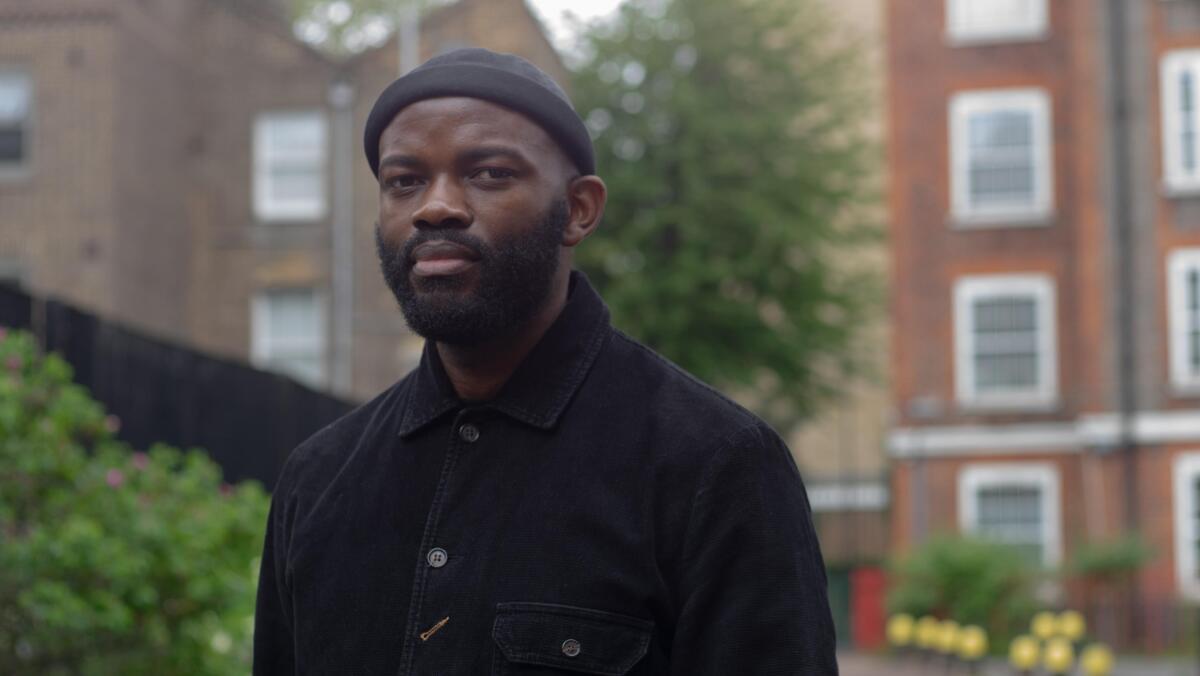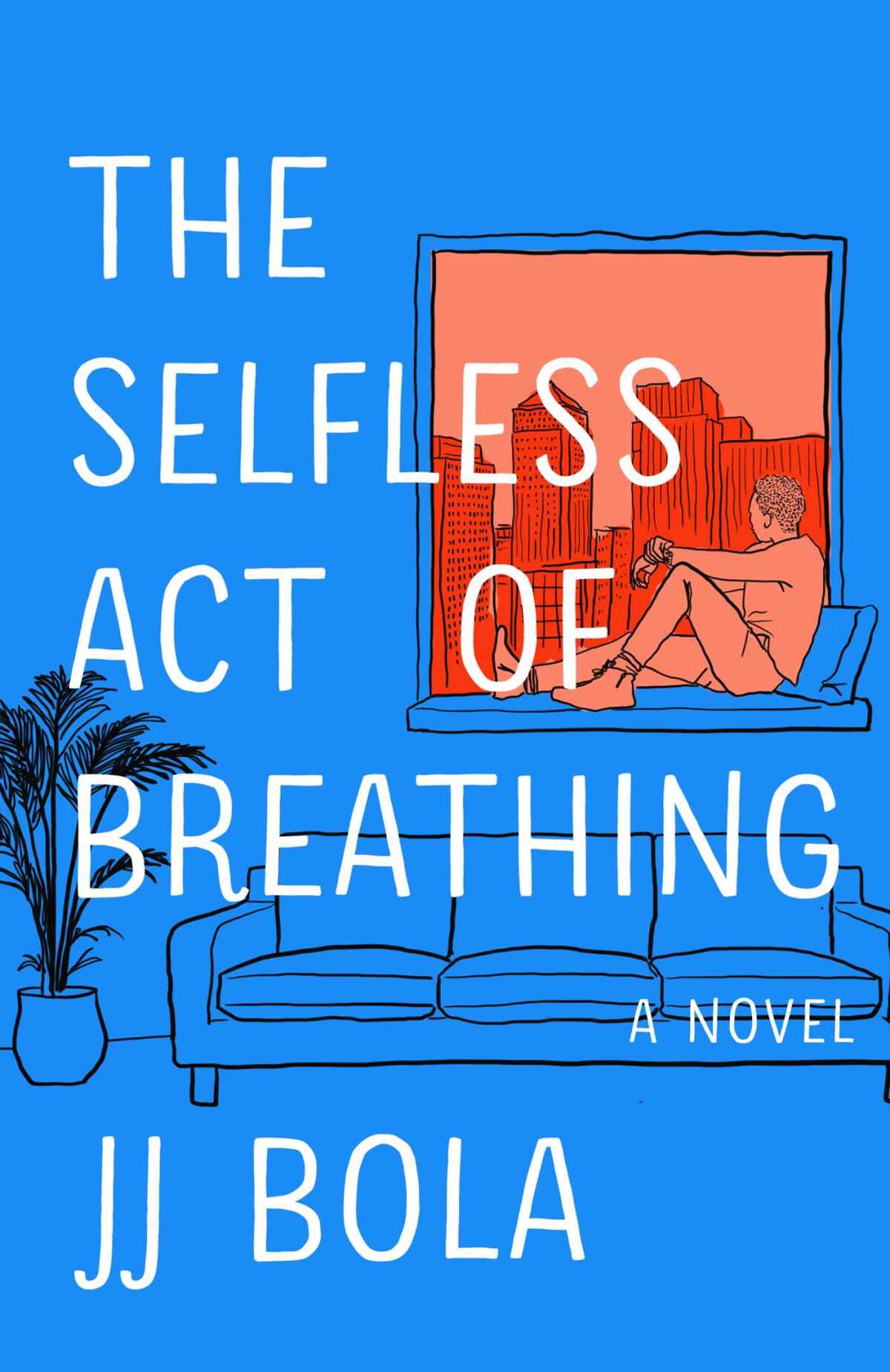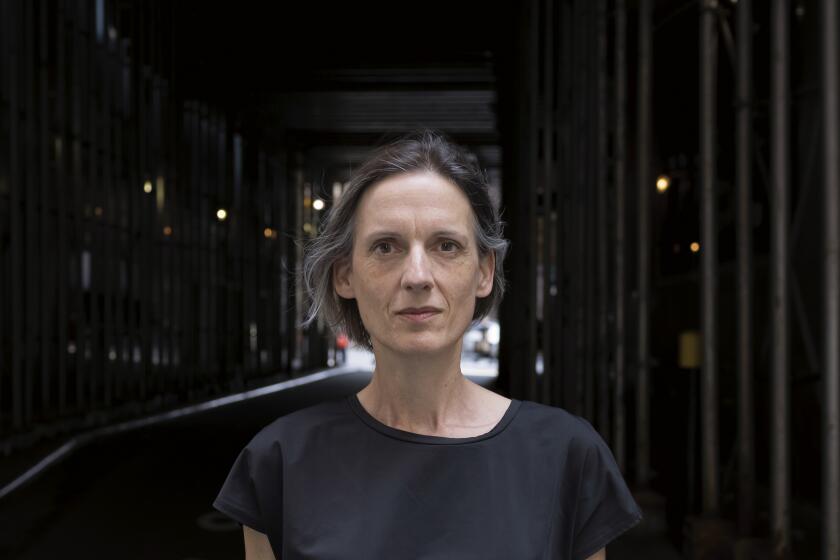Why a refugee novelist sent his protagonist on a suicidal American road trip

- Share via
On the Shelf
'The Selfless Act of Breathing'
By JJ Bola
Atria: 272 pages, $27
If you buy books linked on our site, The Times may earn a commission from Bookshop.org, whose fees support independent bookstores.
Michael Kabongo quits his job as a teacher in London, empties his bank account and flies off to America to spend all his money: $9,021. He explains this to us in the first half of the first sentence of JJ Bola’s novel “The Selfless Act of Breathing.”
And then he finishes the thought: “and when it runs out I am going to kill myself.”
Bola then pulls the reader down deep into the protagonist’s depression and suicidal ideation, shifting between flashbacks to Michael’s spiraling final weeks in London and his travels across America, where he alternately seeks personal connections and pushes them away. His condition, we learn, is rooted not only in psychology but in grave injustices — his father killed by police, his family uprooted from war-torn Africa.
Bola has never shied from tackling heavy issues in his work. He has previously written three books of poetry and a novel that focused on the alienation felt by refugees. Like Michael in the new book, Bola fled civil war in the Democratic Republic of the Congo as a child and grew up in London. And, like Michael, he struggled with depression.
Bola also wrote a nonfiction book titled “Mask Off: Masculinity Redefined”; through Michael, he continues to explore how Black masculinity undermines men’s ability to come to terms with their vulnerabilities.
Bola spoke recently via video about his own personal journey and how he hopes readers react to Michael’s plight. The interview has been edited for length and clarity.
In her Booker Prize-shortlisted novel ‘The Fortune Men,’ Mohamed delved into the true story of a Somali immigrant framed for murder in 1950s Wales.
In your poem “Refuge,” you wrote, “made this our home until we lived just like them.” Do you feel you and your peers have lost or gained something by assimilating?
It was a hybridity, a merging of the two: We were aware that we weren’t as informed about our culture because we’d left our family and friends back home, but we were getting this new experience. We’d speak English and mix in French and Ngala, and that became the norm among our generation. I feel that, for me, it expanded my world instead of taking away from it.
Did that shape you as a writer?
It shaped my perspective but also the way I use language. In Ngala, we don’t say the sun has risen or has gone down; we say the sun has appeared or the sun hides. Visually the sun going up and down makes sense, but to say the sun has appeared this morning sounds almost poetic.
How did you start writing?
I was struggling with depression in my late teenage years and early 20s, not knowing what direction my life was going in. There was a sense of instability in my living situation and in the situation back home. I found poetry — I hadn’t grown up doing creative things — and fell in love with writing. I was working with at-risk youths and writing poetry for fun. A friend persuaded me to go to open-mike night. I had no idea you could earn a living as a writer. I remember the first time I was paid — 15 pounds to read poetry for half an hour, that was mind-blowing to me.

Why did you decide to write a nonfiction book as well?
Having studied sociology and psychology and having read a lot of the academic literature, I wondered how to fill the gap between academia and everyday experiences. I wanted to write something that spoke more directly to the young man walking down the street and to propose some solutions. If we can move things forward just a little bit, then things will get better.
How much did your depression shape this new novel, and how much of Michael’s relationship with his students was shaped by your work with teenagers?
A lot of my writing is influenced by my own experience and the world around me, including that job, but not in an absolute sense. While I draw on my own experiences, Michael is definitely his own character. There were times where Michael would do things, and I’d say, “Please don’t spend all your money on strangers at a bar. Stop.” And I’m the one writing it.
He’s interviewed Neko Case, Jeff Tweedy and Maria Bamford about depression. With his new memoir, “The Hilarious World of Depression,” John Moe looks inward.
Michael never seeks help for his depression. Did you?
I have seen a therapist, and it was transformative. But studies suggest that when people are having a mental health experience, it takes about two years for them to recognize it. Michael is not necessarily recognizing it in his own life yet, even though he’s acutely aware of the burdens he is feeling.
There’s also the issue of Black masculinity — seeking help for mental health issues is taboo. I’ve read 53% of men would feel shame or embarrassment in seeking help or taking time off work. So Michael goes to extremes. With depression, there’s this invisible weight; you are trying to find ways to offload it but not burden the people around you.
Having written nonfiction, what are you hoping to accomplish by putting this kind of experience into a novel?
This is one person’s story, and they’re not always going to do the right thing, and that’s OK. The first thing I’m hoping for is just empathy. I want the reader to sit with this person and not think about fixing them or saving them.
When someone tells us their problems, we want to fix it. When it comes to depression, we say, “You need to do this or do that,” and sometimes that is problematic. I’m learning this myself. I’m teaching myself not to try to fix everything and not to feel frustrated with that.
For a reader who might be experiencing these thoughts, the depression — the suicidal ideation — the book could say, “Look, you’re not alone in feeling these things.” I want to normalize this without sensationalizing it.
At the end of the book, there are dramatic and surprising shifts in the fate of two characters. Yet both happen off the page and without explanation. Why?
I wrote so many different endings trying to figure out what felt most authentic. I think it would have been presumptuous and almost condescending to explain the why and how. I’m not trying to convince people about why someone might think about ending their own life or whether someone has a reason to. It felt like it would be misleading with these characters to just spell out the formula. I’m just trying to get people to connect with what’s happened to the characters.
In ‘Home/Land: A Memoir of Departure and Return,’ Rebecca Mead, who returned to England after decades as an expat, asks what it means to be home.
More to Read
Sign up for our Book Club newsletter
Get the latest news, events and more from the Los Angeles Times Book Club, and help us get L.A. reading and talking.
You may occasionally receive promotional content from the Los Angeles Times.











